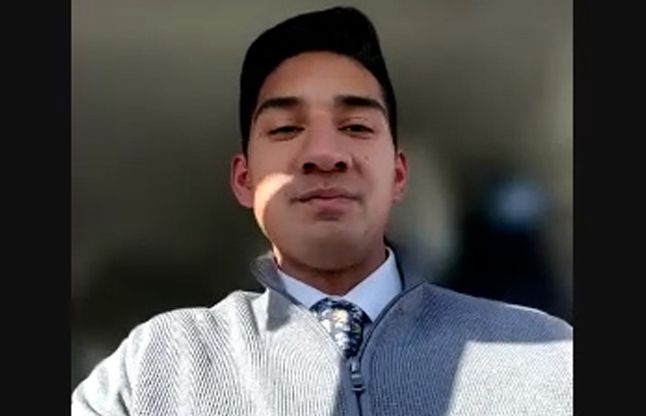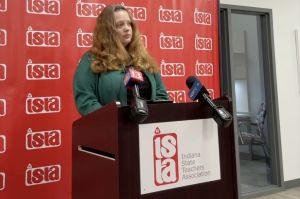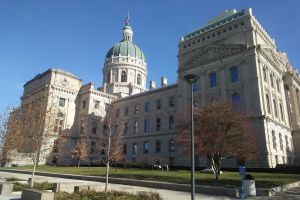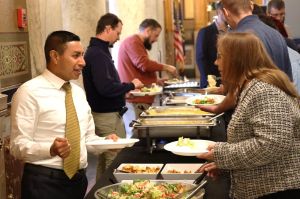Hello, and welcome to ask the mayor on WFIU. I'm Joe Hren, and with Terre Haute mayor, Brandon Sakbun, hello, welcome. How's Terre Haute today?
Speaker 2
Uh, Terre Haute is very busy, Joe, I I'd imagine that some of our building and our construction permits would actually slow down just in the winter months. That's natural. We see that a lot, and that is contrary to the case. So our housing, residential developments continue to pour in a number of commercial developments as well. So really, really good, strong. And towards the year 2024 has been a really good year for us as a city, and we're looking forward to 2025
Speaker 1
I know schedules are so busy this time of year, thanks for still letting us do this, even though we're doing it on Zoom today. So thank you so much.
Unknown Speaker
We'll get you back to paradise.
Speaker 1
Don't worry. Sounds good? Yeah, I wanted to start with this new ordinance we heard about that's proposed to limit the number of vape shops in Terre Haute. What's the proposal and where did it come from?
Speaker 2
So, you know, I'm very cautious to use the word limit in terms of the total number. What the ordinance is actually designed to do is say, hey, if we do have a vape shop, a new store. That's primary purpose is selling vapes, cannot open up within a mile of the other store. And of course, we are going to grandfather all the stores who currently are in that criteria, just because one that would be completely unfair to come in and force them to close down. We are not going to do that. What we are seeing is we want the city to grow. What we don't want to see is just a vape store on every other corner in the city of Terre Haute. We want to see stronger restaurants, retail, boutique stores, parks, houses. We don't necessarily want to you know, we've got enough vape stores as is, and we are also updating to state standards. With this ordinance, a number of state and federal laws have changed as it when it comes to vapes, so we are updating our code to meet the requirements set for us by the state government the federal government. So it's a lot of updating, and then the caveat being, hey, we're just we're trying to limit growth in this one particular instance.
Speaker 1
And where is that right now, and what's next for it? So
Speaker 2
we did table the ordinance. I personally tabled it myself only because we do want to add some language in terms of who enforces it. Right? We did not. We were not specific. So we'll be more specific and add the tariff Police Department in terms of enforcing and we'll have a registry of all the vape stores for that police department to be available to them.
Speaker 1
I see you're trying free transit. You had a press conference last week sounded like fees really weren't much of the overall budget to the system. So I guess I don't know much about the transit system there in Terre Haute. Is this a step to trying to improve what you already have? This
Speaker 2
is so one it's very hard to change ridership, to change total number of busses, because what we have to do is to do any sort of changes. If more people aren't on the bus, state and federal government will not give you more funding. They are responsible for 95% of funding for the transit department. We are required to have a local source of revenue, which we've used gaming revenue to replace the fare system that we have. In addition to that, Indiana State University renewed their contract with the city of Terre Haute, and there was a slight increase in their contract. And they were very open. They enjoy the services they get, but they want to be strong community partners. A lot of people kind of get on Indiana State and even at times union saying, Oh, they don't pay taxes. They're not paying their fair share. What we have seen is that when we work with these strong community groups that do have that non profit type status, if you engage in a good dialog and show them a cohesive plan, they are more apt to sign on board to help the overall community. Transit has been one of the number one barriers to employment, to quality of life and to growing Hoosier families. What we know and understand is that prices have gone up, and while a mayor cannot change the price of groceries or gas prices, what a mayor can do is advocate for those little policy changes, like free transit that can lead to a couple extra dollars in someone's pocket. Our non profit community that addresses homelessness, they spend 1000s, 1000s a year on bus passes that they give to folks who utilize their service to get to and from work or to and from social services that this decision now saves their budgets by 1000s and allows them to pump more back into the people that they serve. You
Speaker 1
know, I like to look back at our first interview in January. Can you believe it's been a year? By the way? No, no, not
Unknown Speaker
at all. I do think I have a few more gray hairs.
Speaker 1
I have a quote from you saying, so we're firing on all cylinders. I'm an early riser. I work late at night. It's been almost a year of 11 months, let's say but. How's it going?
Speaker 2
Really good, Joe. I mean, you know, we face a number, a number of challenges local government. People demand, right? They they really demand the best services. And you know, we are in a state with certain regressive tax policies that make it really hard to financially do that. And I just want to be clear, I'm not sitting here saying we should raise taxes. What I'm saying is the product that we try to offer our consumers, the tax base, it is very hard to meet individual standards with the budget that we have, and that's okay. That's a challenge that we all face. We've done everything we can to be as efficient as possible. We've changed equipment, we've updated staffing, and folks are starting to see the result. We're paving roads at a faster rate. We're adding sidewalks at a faster rate. We're improving on a number of our community parks. Our building permit date and our new construction is also clearly showing that there is investment in our community, and we're taking tangible steps to address things like workforce development and public transit.
Speaker 1
You know you retweeted as a story from it's called state affairs, where Governor elect Mike Braun was saying local governments will have to replace revenue losses from his proposed property tax plan. I know that I would be former mayor Duke Bennett's worst nightmare. Is this really alarming to you? Well, I
Speaker 2
think it's very important that you you point out that it would be former mayor Bennett sports nightmare. And the only reason I say that is Duke Bennett was a Republican. Mike Braun is a Republican. And here, you know, a number of Republican mayors have also shared similar concerns. And here is why, if you were to say we're going to lower property taxes or or roll them back to fund your necessary services like public safety, you would need to come up with revenue replacement. To replace that revenue, one option that they are toying with is it an additional local income tax that cities and counties can decide to partake in. So this would create a situation where we could decide to add an income tax to help fund police and fire. Here's the downside to that, Joe, right now you got, well, let's use an example. You've heard me get frustrated with negligent landlords at times. So someone who owns, say, 10 to 20 parcels, right can now essentially say, Well, my taxes are lower, but the 20 families that are in these homes and deteriorating conditions, we now have to go to them for their income tax. So all this is doing is shifting the burden from one unit of government to the other, and it would be different if there was some transformational, you know, state funding mechanism that made all of this possible. But unfortunately, that's not the case. I am open to having conversations about it, I do think we could take a hard look at assessments. I think there are some loopholes in the tax code and tax benefits that you know, a very, very small portion of the population in a certain tax bracket, certain income level, take advantage of, and it puts the onus on the everyday Hoosier who can't afford a tax attorney to navigate that tax code. But a lot of this, this is all conversations with the state legislator, and I give my feedback to the state legislator, and we'll let them decide, and if they decide, hey, look, sorry, less on property taxes, more on income taxes, that's a hard conversation we're going to have to have with the City Council, as well as with the residents here, if you want a strong public safety team, if you want to maintain what services we do have, we would have to have that conversation about an in a local income tax, which I absolutely do not you know, no mayor or elected official wants to have that conversation about, hey, we're going to have to increase something, whatever it may be, but it's a challenge that we will prepare to have, and
Speaker 1
there's unfunded mandates. Back on your very first show in January, you talked about your kind of number one thing was the long term control plan. How's that coming along?
Speaker 2
So we are doing well with our coordination with idem on that plan. We've actually already started a number of those projects. We've got the brown stormwater projects, the large, big one that everyone sees, but we've done a number of smaller storm water projects as well as main lift station updates. We believe that, you know, we have a pretty strong fiscal strategy to make it through that long term control plan with as few rate increases as possible. And it's always a delicate balance. Joe, I like to remind all Hoosiers when I talk about sewage rates. For example, this state has a number of private utility companies. They raise rates over and over and over again. And yes, they do have, you know, C suite level executives making large sums of money. We don't have that in the city of Terre Haute. The money that we get from our system, our sewage system goes right back into the system to update it, so we don't have this very high profit margin that a private utility company does, and that's one reason why I do advocate for certain utilities being public instead of private, because there's not this focus on profit, and instead, there's this focus on progress and benefits to the people. So. Hey,
Speaker 1
I know you have to get going. My last question, just because it's our last show of the year, what's your number one thing you're most proud of this past year? And also maybe a little holiday message to everyone listening very
Speaker 2
hard. To boil it down to one, Joe and I'm going to do that little political thing here where I highlight three one. We've really improved our demolition and our home building strategy. So we're seeing investments everything from Income Based housing, which is often called affordable housing, all the way up to market rate housing supplemented with a strong demolition programs addressing blight that the private sector has not chosen to invest in. Uh, number two is public safety. We've made some substantial investments to public safety in terms of, you know, training budgets and equipment, and we look forward to ongoing conversations for next year, trying to get that public safety pay where it should be, really trying to get most of our city employees pay where it should be. Of course, that's a hard conversation to have when you've got the state legislator in that property tax negotiation already starting, and we recognize that that's going to be a challenge. And number three is, you know, what are kind of Public Works style departments have done this year is incredible, anything from wastewater to the street department, and, of course, the Parks Department updating a number of municipal parks and really showing that, hey, this is a community where regardless of your zip code or address, we are going to do our best to deliver quality services like roads, public safety and parks right to you and for a holiday message, almost that one to all Hoosiers, not just those in Terre Haute, have a great Christmas if you celebrate and if you don't, have A Happy Holidays. Thank you for choosing the best state in the United States of America to live. Have fun with your family, your friends and God bless
Speaker 1
Mayor Sakbun. Thank you so much for being on the show. We'll see you next year.
Unknown Speaker
We'll see you. Thank you, Joe.
Unknown Speaker
Thank you. You.














